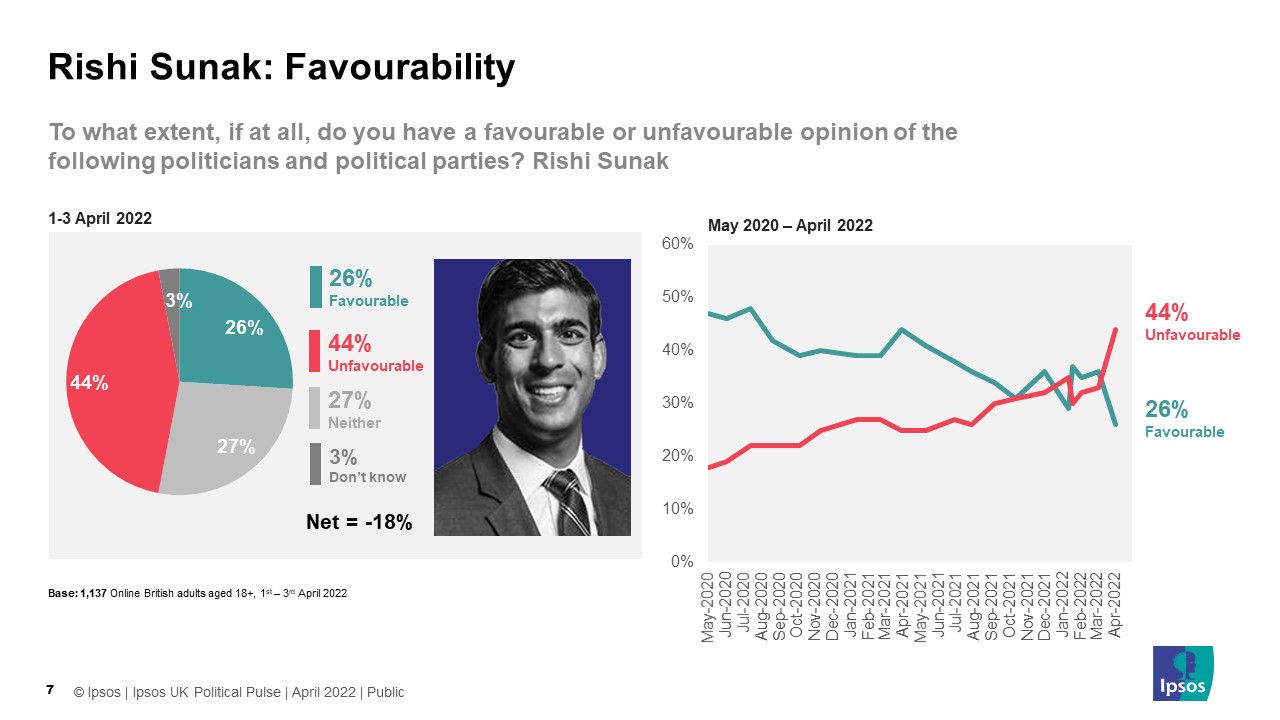Ipsos poll shows Rishi Sunak’s favourability ratings lowest since he became Chancellor
Ipsos poll shows Rishi Sunak’s favourability ratings lowest since he became Chancellor
- 26% of Britons are favourable towards the Chancellor and 44% unfavourable.
- 56% think country heading in the wrong direction – highest number this parliament.
- 52% think Johnson should resign if issued with a fixed penalty notice over ‘partygate’
The latest Ipsos UK Political Pulse survey, taken April 1st to April 3rd shows public favourability towards Sunak falling sharply this month. His ‘net favourability’ rating now stands at -18, comfortably the worst he’s recorded since becoming Chancellor. In fact, the only other time he has recorded a negative net rating was in January this year (-6).
Favourability towards Sunak and others

- Overall, 26% of Britons are favourable towards Rishi Sunak (-10pts from March), 44% are unfavourable (+11). His net rating of -18 is the lowest he has recorded in our series.
Meanwhile, other Conservatives see declining ratings compared to March but not to the same degree:
- For the Prime Minister Boris Johnson, 25% are favourable (-2pts), 54% unfavourable (+2).
- For Health Secretary Sajid Javid, 26% are favourable (-3pts), 37% unfavourable (+6).
- For Foreign Secretary Liz Truss 19% are favourable (-2pts), 42% unfavourable (+5).
- And for Home Secretary Priti Patel 15% are favourable (-5pts), 55% unfavourable (+4)
Labour leader Keir Starmer’s ratings are largely unchanged from last month, 30% are favourable towards the Labour leader (+3 pts from March) and 41% unfavourable (+2).
Favourability towards parties
The story for political parties is similar with the Conservatives seeing worsening favourability ratings but Labour’s largely unchanged:
- 24% favourable towards the Conservatives (-3 points from March), 51% unfavourable (+7).
- 31% favourable towards Labour (+2pts), 41% unfavourable (+2).
- Meanwhile 24% and 18% are favourable towards the Greens and Lib Dems respectively with 30% and 39% unfavourable.
Right direction / wrong direction & what is catching the public’s attention
When asked whether things in Britain were heading in the right or wrong direction:
- 21% said things are heading in the right direction (down 8 pts from March) and 56% said wrong direction (up 12pts). This is the highest proportion saying wrong direction this parliament (the closest number was 53% in October 2020).
- When asked how closely they are following various news stories this week, 87% say they are following stories about the rising cost of living closely (49% very closely) and 83% say they are following the Russian invasion of Ukraine closely.
- In contrast, 59% said they are following stories about fines being issued related to Downing Street parties that broke lockdown rules. Similar to the 55% claiming to follow the story about Will Smith hitting Chris Rock at the Oscars closely.
Partygate and should Johnson resign?
- 52% think Johnson should resign if he’s issued with a fixed penalty notice for breaking COVID rules. 22% are opposed.
- Note in a similar poll taken late January / early February, 58% thought Johnson should resign.
Elsewhere in the poll:
- 28% think Brexit has had a positive impact on the country (-2 points from March) and 45% say negative (+1). 22% think it has made no difference (+3). The remaining 6% say they don’t know.
Keiran Pedley, Director of Politics at Ipsos UK said of the findings:
We are starting to see clear evidence of Rishi Sunak’s personal poll ratings falling amidst public concern about the cost of living in Britain. This poll shows that the public are following such discussions closely. Meanwhile, we have seen in other Ipsos research how economic optimism is the weakest it has been since the financial crash and the public are increasingly associating ‘the economy’ with rising prices. In this context, it is hardly surprising to see the Chancellor’s ratings fall. Where they go from here will likely be closely tied to how the public feel about the cost of living and wider economy in the coming months and beyond.
Technical note
- Ipsos UK interviewed a representative sample of 1,137 Britons aged 18+. Interviews were conducted online from 1-3 April 2022. Data are weighted to match the profile of the population. All polls are subject to a wide range of potential sources of error.





